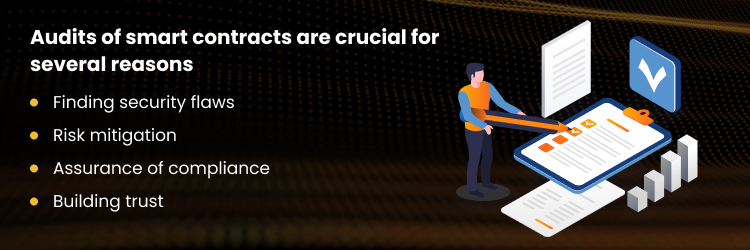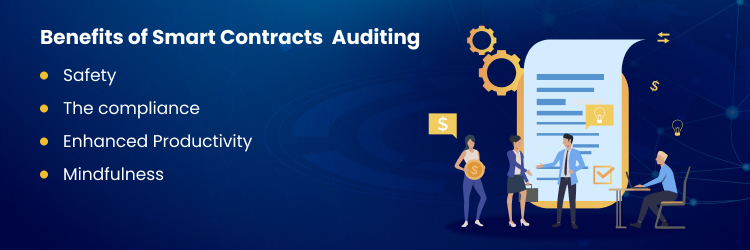It is impossible to overestimate the crucial role that smart contracts play in driving decentralized ecosystems and apps on the rapidly developing Web 3. The chance of errors increases in tandem with the complexity and scale of these systems. To achieve flawless, error-free operations, Web3 developers must conduct smart contract audits; they are not just an option.
Because they may automate and streamline company processes, lower expenses, and promote transparency, smart contracts have gained popularity in recent years.
Smart contracts do carry some risk, just like any other technology. Vulnerabilities or bugs in the code can result in expensive mistakes, security lapses, and even monetary losses. For this reason, it's critical to carry out routine smart contract audits to ensure they operate as intended and are secure from any threats.
This article will examine smart contract audits in more detail, covering their definition, significance, and recommended procedures. We'll also review some typical problems with smart contract audits, failed audit scenarios, and advice on selecting a smart contract auditor. In conclusion, we will talk about the prospects for smart contract auditing going forward and what to anticipate in the future.
A Smart Contract Audit: What Is It?
An extensive examination of a smart contract's code, functionality, and design is known as a smart contract audit. Its goal is to find any possible problems or weaknesses that can jeopardize the integrity, security, or functionality of the contract. Independent third-party auditors with a focus on blockchain technology and substantial knowledge of the creation and security of smart contracts usually carry out smart contract audits.
The audit procedure entails a thorough analysis of the smart contract's code, including confirmation of its correctness and alignment with the desired functionality. In addition, a study of the contract's design is required, along with the detection of any potential attack vectors, security risks, or other weaknesses that bad actors might use.
Verifying that a smart contract functions as intended, is safe and dependable, and conforms with all applicable legal and regulatory standards is the aim of a smart contract audit. A smart contract audit that is done correctly can spot possible problems early on and avoid expensive mistakes, security lapses, and other concerns later on.
Why Do Smart Contract Audits Exist?

Audits of smart contracts are crucial for several reasons, including:
Guaranteeing the functionality of the contract: A smart contract audit can assist in confirming that the contract functions as intended and that the contract code appropriately reflects the intended functionality.
- Finding security flaws: Audits can find possible security threats and flaws in the code, including openings or weaknesses that hackers or other bad actors could take advantage of.
- Risk mitigation: Smart contract audits can assist in reducing risks and averting expensive mistakes, legal battles, and monetary losses by seeing any problems early on and taking appropriate action.
- Assurance of compliance: Audits can confirm that the contract conforms with all applicable legal and regulatory requirements, including financial rules or laws about data privacy.
- Building trust: A successful audit report can contribute to the legitimacy and reputation of the contract and its related parties by fostering a sense of confidence and trust.
All things considered, smart contract audits are necessary to guarantee that smart contracts operate as intended, are safe and dependable, and adhere to all applicable legal and regulatory requirements. Audits contribute to risk mitigation, trust-building, and the long-term success and viability of smart contract initiatives.
Benefits of Smart Contracts Auditing

The advantages offered by smart contract auditing services are expanding along with the sector. Below are a few of the beneficial pointers:
1. Safety
The enhanced safety and dependability that smart contract auditing provides are its main benefits. You can be certain that any possible security flaws will be found and addressed if you have a reputable organization audit your smart contracts.
2. The compliance
Compliance is an additional advantage of smart contract audits. It is crucial to ensure that your smart contracts comply if you are working on a project that is going to be inspected by regulators. Smart contract audits can assist in making sure that rules and industry standards are followed.
3. Enhanced Productivity
Your smart contracts' efficiency can also be raised with the aid of smart contract auditing. You can prevent any expensive delays or interruptions in your project by identifying any possible problems or mistakes.
4. Mindfulness
And last, you can feel more at ease with smart contract audits. With the assurance that your smart contracts have been carefully examined and approved by a reputable business, you may proceed with your project with confidence.
How does Pixel Softwares work?
Pixel Softwares emphasizes the importance of regular smart contract audits to identify vulnerabilities early, ensure the security of blockchain applications, and prevent lasting issues due to undiscovered flaws.
The process of a smart contract audit
The process for conducting a smart contract audit is very widespread, although different smart contract auditors may follow different guidelines. An example of a typical process is this:
-
Collecting models of code design
-
Run unit tests
-
Select auditing approach
-
Draft the initial report
-
Publish the final audit report
Final Thoughts
Auditing smart contracts is a crucial component of any blockchain project. To guarantee the security, compliance, and effectiveness of your smart contracts, pick a reliable provider of smart contract auditing services. Your smart contracts will be handled by a qualified team, so you can unwind and take pleasure in the peace of mind that comes from knowing they are in capable hands. If you want more information, contact us.